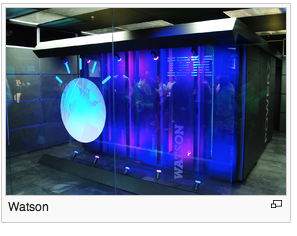Robotic Lawyers and Other Science Fiction About the Future.
Posted By Cliff Tuttle | April 12, 2015
No. 1,136
A filler article in USA Today recently listed “small-time” lawyers as a professional group that will not exist in 15 years. It states that computers will take over the services presently being performed by these lawyers.
Such predictions are not new. The age of artificial intelligence is dawning. The IBM Watson computer, which beat two of the all-time champions at Jeopardy, is being adapted to render medical diagnoses. According to the Wikipedia article linked above, 90% of the nurses who currently use a version of Watson adapted for nursing follow its advice. It has been suggested that one day Watson will analyze cases and write briefs. And of course, another version of Watson for judges will read the briefs and write opinions.
But don’t get too carried away by all of this. Watson, after all, is still only a tool used by living, breathing humans. The prospect of something so complicated as a legal dispute being analyzed, presented, decided or even settled without direct intervention of humans is far enough in the future. It is safe to say that artificial intelligence will transform the whole world in millions of ways before that happens. Plenty of other professions, such as teachers, pharmacists, real estate agents and even accountants will probably become extinct, or nearly so, first.
Nevertheless there is no doubt that the practice of law is changing. Many tasks that were once performed by lawyers are being performed by paralegals, usually under the supervision of lawyers. The legislature has enabled non-lawyers to present cases in certain tribunals , such as district magistrate’s hearings, unemployment hearings and assessment appeals. Forms for wills, leases and the like are available on the internet, as are kits for incorporating a business, getting a divorce, writing a will and the like. And, most significantly, residential real estate closings have become the domain of non-lawyer settlement services, many of them owned and operated by lenders and large real estate brokers.
Moreover, technology has affected the practice of law in a big way. Lawyers have an array of tools that make them more productive and incidentally, more cost-effective. These include legal databases, websites, software and especially email, cell phones, iPads and soon, the Apple Watch.
But the idea that sole practitioners and small firms will cease to exist in 15 years because of technology and other changes is ludicrous. Moreover, the USA Today article predicts that the solos and small firms will vanish, while larger firms will not. Things are a little more complicated than that.
Large firms charge large hourly fees. They have to — they have a large nut to carry. But most clients cannot afford them and the overwhelming majority of cases and other legal tasks do not justify high fees. Lawyers at big firms know this. They routinely turn down work that is too small or refer it to more affordable lawyers who are a better match for the client and the job.
Although mega-firms have been growing as they open branches or merge around the country and the world, there is a significant counter-trend. Refugees from large firms frequently set up “boutiques” that are highly specialized in a narrow area of practice. Clients at their former firms follow them.
Solos and small firms come in all varieties. They comprise approximately 2/3 of the lawyers in Allegheny County. Many have found a market niche in which they successfully compete for clients.
The claim voiced in USA Today that work for independent practitioners is drying up is simply not true. Yes, some of it is changing, but a new generation of lawyers is changing, too. For example, you find more of them in family practice, one of the fastest growing areas in the law.
Quite frankly, almost every area of the law has become more complex in the last few decades. There are hidden pitfalls and opportunities that are unknown to lawyers who practice outside that specialty. Lay people who decide to represent themselves in court are doubly vulnerable. They may escape harm once or twice, but eventually something they don’t know will jump up out of nowhere and bite them.
And the idea that unlicensed advocates can do just as well as licensed attorneys at small tribunals is not supported by experience. I have cases against them occasionally. The gaps in their education and training are usually glaring. They have only a rudimentary understanding of the law of evidence. Many ask questions poorly, often lapsing into speeches that are quickly cut off by objection. And they rarely research the law that is applicable to their case, relying instead upon maxims and rules of thumb that someone told them. It is unlikely they save their employers money in the long run. What they might save in attorneys fees (I say might, because many lawyers charge competitively) they give back in cases lost that could have been won or mitigated.
At least for the next 15 years, and probably far beyond, there is going to be a place for small-time lawyers because they fill a need in a cost-effective way. Change will close doors, but it will also open others.
CLT




